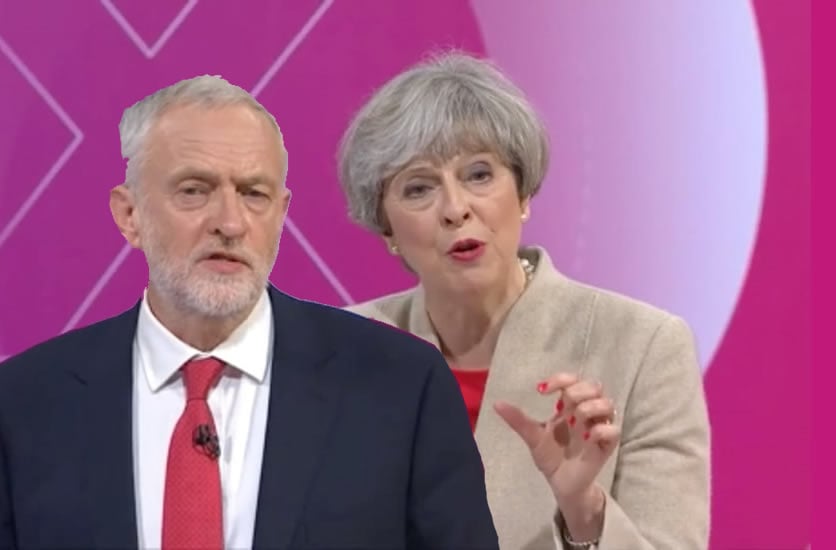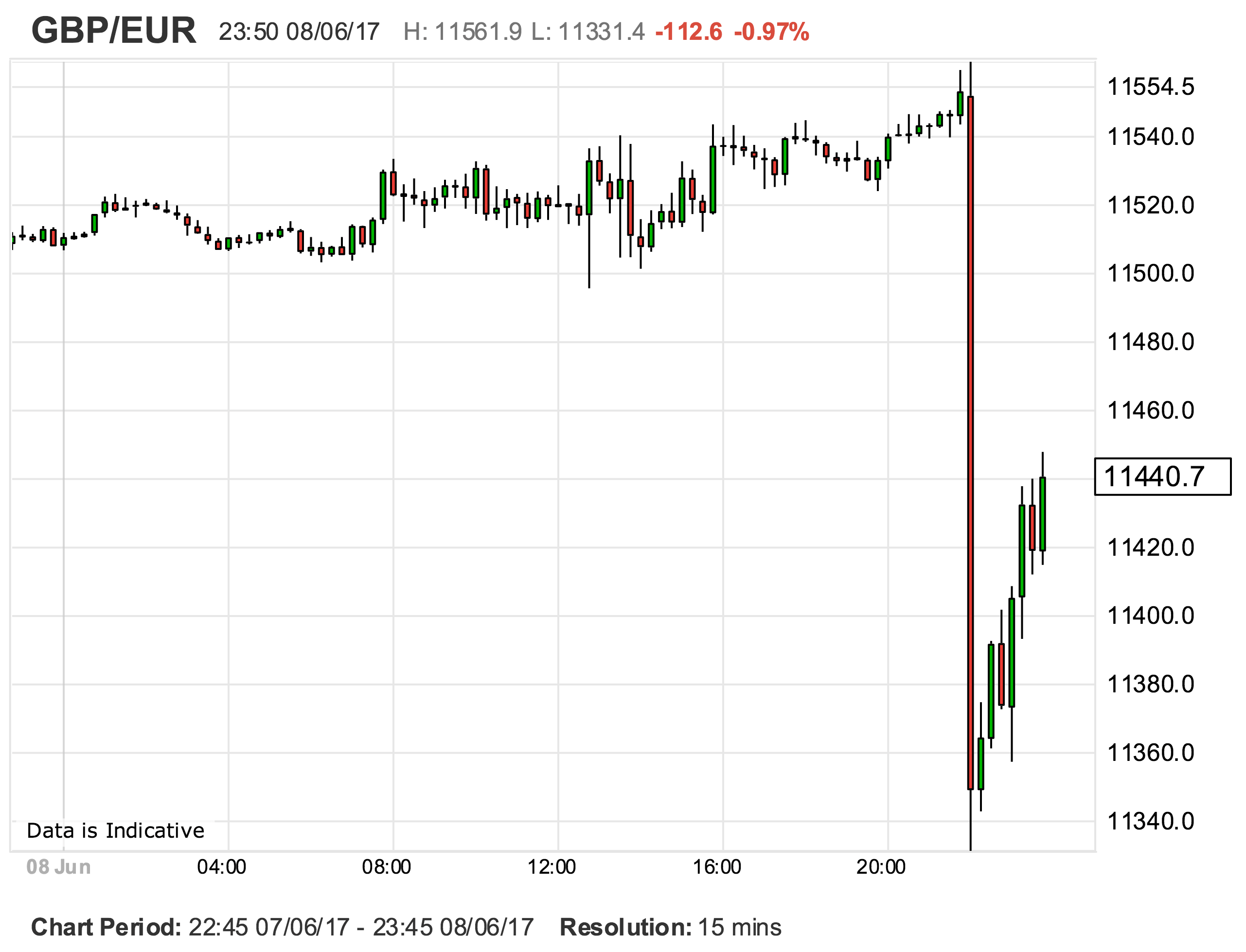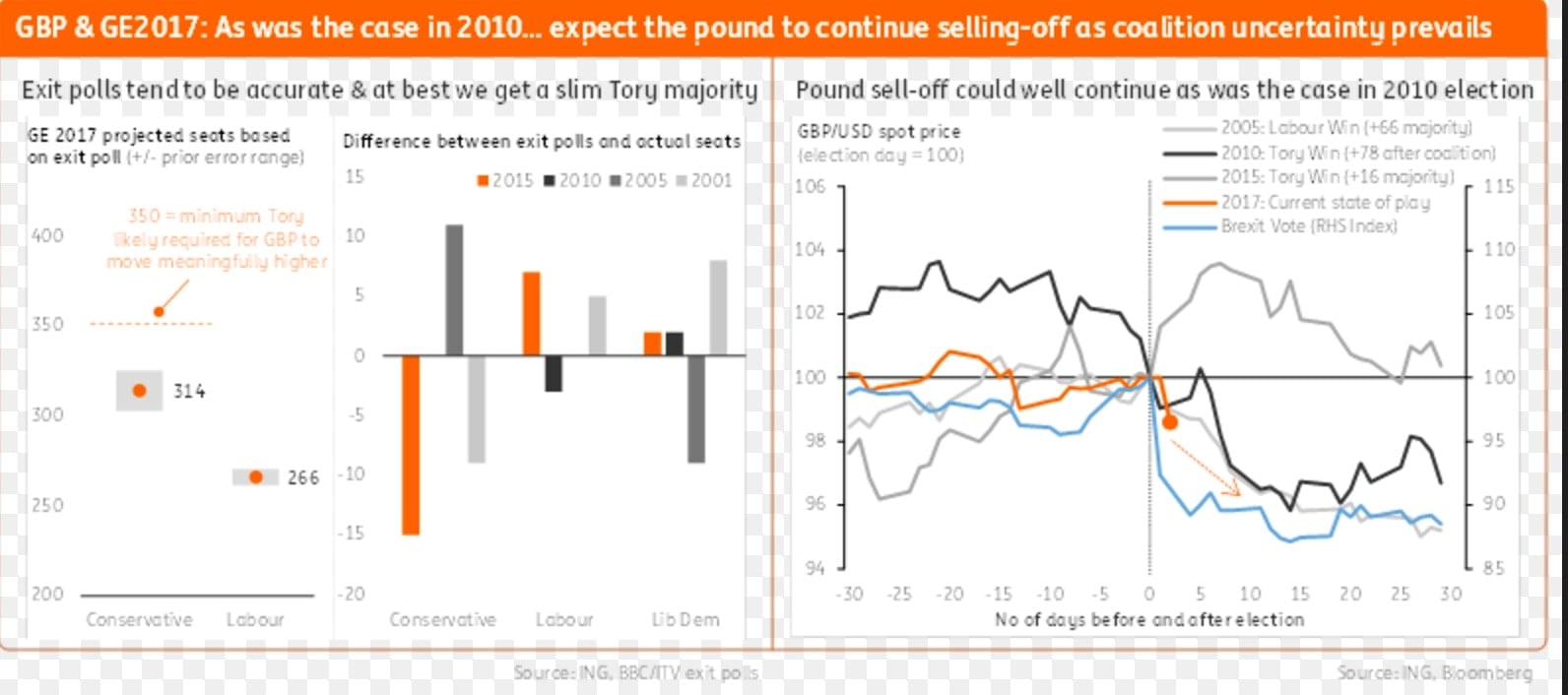Pound Sterling Dives Against Euro, Dollar as Hung Parliament Beckons: Analyst Reactions

The Conservative party is forecast to lose its majority in the UK parliament amidst a massive swing by UK voters towards the opposition Labour party.
The UK Pound crashed lower by over a percent as a result, with traders believing the UK faces a period of fresh political uncertainty at the worst possible time.
Brexit talks with the EU are due to start next week and there is no clear mandate for UK negotiators on this result. The country is more divided than ever and we don't see Theresa May being able to continue in her role on the back of her political gamble going terribly wrong.
The reaction by the currency market to the Pound was unambiguous in that the added layer of uncertainty to the country's outlook is not welcome:
"Has May’s great gamble failed? If accurate a hung parliament leaves Theresa May’s position as leader in serious doubt and makes the process of Brexit incredibly uncertain," says Neil Wilson, analyst with ETX Capital.
We struggle to see how the Conservatives or Labour would be able to form any kind of coalition.
More Downside Ahead for Sterling
As we have noted over recent weeks of pre-coverage, the best outcome for the Pound would have been the securing of a majority of 50 or above for the Conservatives - or even Labour for that matter - in that it guarantees stability.
Anything less would be bad for the Pound, and this is what appears to be the case.
"A hung parliament throws open all kind of doubts, uncertainty and indecision over the looming challenge of Brexit. We have the possibility of a coalition government and all that entails," says Neil Wilson at ETX Capital.
We believe eventual confirmation of a hung parliament could prompt as much as a 2-4% decline in GBP across the board
— World First (@World_First) June 8, 2017
Chaos for the Pound: Downside Targets
The worst-case scenario for Sterling would be a hung parliament - i.e a situation where no party controls parliament and no coalitions are built.
"A hung parliament is surely not a GBP-positive scenario. Rather it could prove to be the long-term worst scenario for GBP although we would not expect a major beating to the GBP even in a confirmed hung parliament scenario," says Andreas Steno Larsen at Nordea Markets.
Analyst Viraj Patel at ING doesn't mince his words when he says a hung parliament would result in chaos for Sterling:
"There is no doubt that a hung parliament is the worst case. We noted that maximum chaos would be if the Conservatives are only able to get somewhere between 290 to 325 seats; it’s the grey area where it’s not enough for a Conservative majority, but also potentially not enough to see a stable Labour-led coalition being formed quickly.
"The margin of error on exit polls is typically low (LHS chart below) and at best it shows that Tories might just be able to get an overall majority. But even a slim Tory majority is unlikely to be convincing enough to suggest that Theresa May’s election gamble has paid off. Potential pressure for the Prime Minister to resign would only add to political uncertainty and further add to the pound’s woes.
"The best playbook for the pound under a hung parliament is the 2010 election; as the graphic below shows, GBP/USD continued to fall in the days after the election as major parties scrambled around to form a coalition. Under a similar environment, we wouldn’t rule out GBP/USD falling to as low as 1.24 and EUR/GBP moving up towards 0.90."
EUR/GBP at 0.90 means a fall to 1.11 in GBP/EUR.
Standard Chartered have also put out their targets:
"Investors could be tempted to buy the British pound (GBP) on the back of the exit poll on the assumption that a smaller Conservative majority or Conservative-led coalition could deliver a ‘softer’ Brexit. While a more conciliatory approach in negotiations with the EU might be expected, until the results are more clearly known, political uncertainty will drive further GBP-USD downside, in our view.
"A move towards 1.24 is our central case over the next 12 hours on a ‘hung’ parliament where the Conservatives emerge as the biggest party. Election night in 2010 provides a useful example. As it became clear that the Conservatives were in the lead but falling short of forming a majority government, GBP-USD fell from around 1.50 to 1.44 as the results came through."
Analyst Kit Juckes at Societe Generale meanwhile tells us that the his expectations for the GBP/EUR on initial signs of a hung parliament would be for a fall to 1.11.
“The possibility of a labour-led coalition that could trigger a much softer Brexit with access to the Single Market - or even another vote - isn't really being considered yet. GBP might eventually benefit from a Labour win, but only after a period of even greater uncertainty weakened it further,” says Juckes in a note to clients.
Losses Could be Short-Term if Labour Form Rainbow Coalition
Brexit negotiations with the EU are due to start on the 19th June, this outcome could not have come at a worse time.
What is clear is that voters are not taken by the Conservative's approach to Brexit.
Whatever the case, we have days of uncertainty ahead and this will weigh heavily on Sterling.
But, longer-term, it might not all be bad for Sterling.
As noted by Bank of America Merrill Lynch, a coalition government, lead by Labour, could be better for Sterling longer-term in that such a coalition would seek a soft-style Brexit while the excesses of Labour's fiscal policy programme would be kept in check.
Deutsche Bank have also identified a coalition government as being positive for the Pound.
“In the event that the Conservatives dropped below 300 seats, a workable majority between the Labour Party, SNP, the Liberal Democrats, Green Party and Plaid Cymru may be possible,” says analyst Deutsche Bank analyst Oliver Harvey. “The initial market reaction could be to sell the Pound, but the medium term implications would be more bullish.”
It is argued that the support of the SNP, Liberal Democrat, Green and Plaid Cymru parties for a Labour government would be conditional on a ‘soft Brexit’ approach, such as EEA membership, and perhaps a second referendum on EU membership.
But analyst Paul Hollingsworth at Capital Economics says forming a workable Labour-led “progressive alliance” may also be tricky - given that the exit poll suggests that Labour, the Liberal Democrats and the Scottish National Party would also have just 314 seats combined.
"If no working government can be formed (the first test would be trying to pass a Queen’s Speech) then there would need to be another General Election," says Collingsworth.
Once again, it seems as if the British public has decided to surprise everyone.
"Now we have to wait for the results to start coming in, but markets will not like the idea of the Conservatives losing their overall majority," says Beauchamp.
Beauchamp says it is also interesting is the low total for the SNP, which will make life difficult for Labour in forming a coalition with them and the Lib Dems.
"This election has been getting more interesting over the past six weeks, and the uncertainty has just been ramped up more than a few notches," says Beauchamp.
Kathleen Brooks at City Index says that at this stage, the uncertainty is likely to keep pressure on the Pound tonight, which has fallen to the base of its recent range.
"In GBP/USD 1.2530 – the low before the election was called – is a key support level. Right now, the market is not in panic mode, but it is shell shocked by this result," says Brooks.







